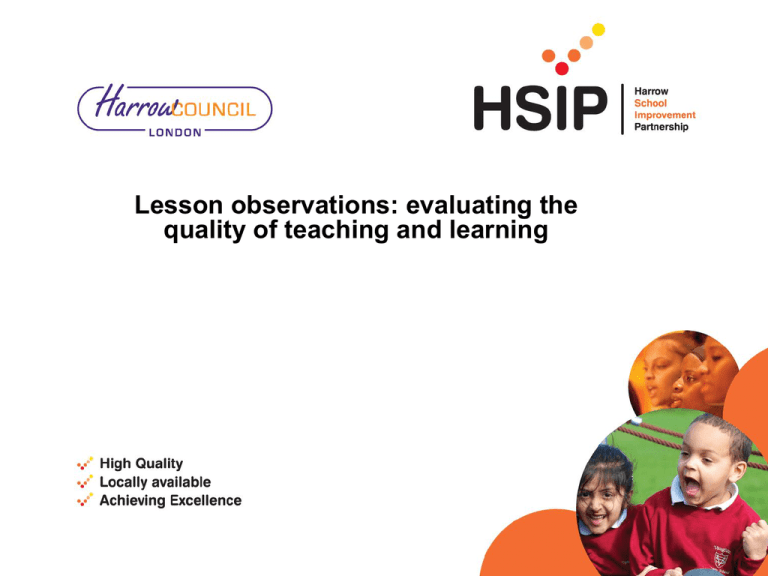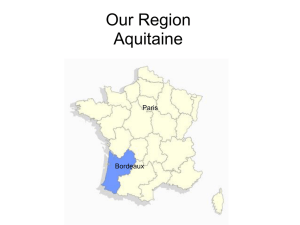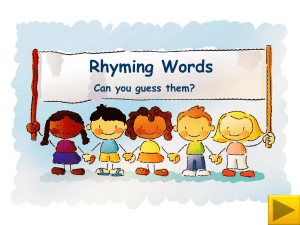Lesson Observations
advertisement

Lesson observations: evaluating the quality of teaching and learning Leading Learning Objectives: ● To increase leaders confidence in making lesson judgements and giving feedback Leading Learning Teaching There is an increased emphasis on the quality of teaching and improving its effectiveness in raising pupils’ learning and progress. ● Good schools are expected to have good teaching and effective systems for improving it ● The judgement on the quality of teaching must take account of evidence of pupils’ learning and progress over time. Inspectors (and schools) must not simply aggregate the grades awarded following lesson observations Leading Learning Teaching ● Inspectors must not expect teaching staff to teach in any specific way or follow a prescribed methodology ● There are very many different teaching styles and inspectors will not make judgements about one ‘right’ way. There is no ‘ideal KHDA lesson!’ ● In lessons, inspectors will expect to see pupils who are fully engaged in their learning and making good or outstanding progress Good Teaching ● ● ● ● ● ● ● ● Good (2) Teaching in most subjects, including English and mathematics, is usually good, with examples of some outstanding teaching. As a result, most pupils and groups of pupils currently on roll in the school, including disabled pupils, those who have special educational needs, and those for whom the pupil premium provides support, make good progress and achieve well over time. Teachers have high expectations. They plan and teach lessons that deepen pupils’ knowledge and understanding and enable them to develop a range of skills across the curriculum. Teachers listen to, carefully observe and skilfully question pupils during lessons in order to reshape tasks and explanations to improve learning. Reading, writing, communication and mathematics are taught effectively. Teachers and other adults create a positive climate for learning in their lessons and pupils are interested and engaged. Teachers assess pupils’ learning and progress regularly and accurately. They ensure that pupils know how well they have done and what they need to do to improve. Effective teaching strategies, including setting appropriate homework, and appropriately targeted support and intervention are matched well to most pupils’ individual needs, including those most and least able, so that pupils learn well in lessons. Outstanding Teaching ● Outstanding (1) ● Much of the teaching in all key stages and most subjects is outstanding and never less than consistently good. As a result, almost all pupils currently on roll in the school, including disabled pupils, those who have special educational needs and those for whom the pupil premium provides support, are making rapid and sustained progress. All teachers have consistently high expectations of all pupils. They plan and teach lessons that enable pupils to learn exceptionally well across the curriculum. Teachers systematically and effectively check pupils’ understanding throughout lessons, anticipating where they may need to intervene and doing so with notable impact on the quality of learning. The teaching of reading, writing, communication and mathematics is highly effective and cohesively planned and implemented across the curriculum. Teachers and other adults generate high levels of engagement and commitment to learning across the whole school. Consistently high quality marking and constructive feedback from teachers ensure that pupils make rapid gains. Teachers use well-judged and often inspirational teaching strategies, including setting appropriate homework that, together with sharply focused and timely support and intervention, match individual needs accurately. Consequently, pupils learn exceptionally well across the curriculum. ● ● ● ● ● ● Good and Outstanding lessons Inspectors will continue to gather a lot of evidence for the teaching grade from lesson observations. They will still grade lessons, and offer feedback. School leaders will grade lessons and offer feedback on a part of a lesson, perhaps with a specific focus. ● What aspects of a lesson are being judged when we are observed? For example: planning, assessment Good and Outstanding lessons ● What aspects of a lesson are being judged when we are observed? Planning Behaviour for learning Assessment Questioning Homework Meeting individual needs Pace Progress – for all Subject knowledge Use of resources Deployment of other adults SMSC (Spiritual, Moral, Social, Cultural) Good and Outstanding lessons ● How can the observer gather evidence to make a lesson judgement? Sources of evidence? Good and Outstanding lessons How can the observer gather evidence to make a lesson judgement? ● ● ● ● ● ● ● Pupils TA or other adults Books Lesson Plan Display Evidence of tracking: tracking sheets, mark book Teacher Observing learning ● ● ● ● ● ● ● When inspectors/school leaders observe teaching, they observe pupils’ learning. Good teaching, which includes high levels of expertise and subject knowledge, with the expectation that pupils will achieve well, enables pupils to acquire knowledge, deepen their understanding, and develop and consolidate skills. Inspectors (leaders in school) must consider whether: work is challenging enough for all pupils and meets their individual needs pupils’ responses demonstrate sufficient gains in their knowledge, skills and understanding, including in literacy and mathematics teachers monitor pupils’ progress in lessons and use the information well to adapt their teaching teachers use questioning and discussion to assess the effectiveness of their teaching and promote pupils’ learning pupils understand well how to improve their work. What do Outstanding lessons look like? ● Exceptional progress ● Inspiring ● Precisely targeted support of other adults ● High quality marking and dialogue ● Pupils understand in detail how to improve ● Consistent support ● Interventions have striking impact ● Acute awareness of prior learning used in planning ● Systematic checking of understanding

![afl_mat[1]](http://s2.studylib.net/store/data/005387843_1-8371eaaba182de7da429cb4369cd28fc-300x300.png)




